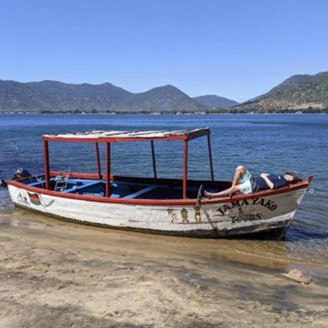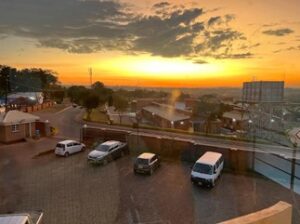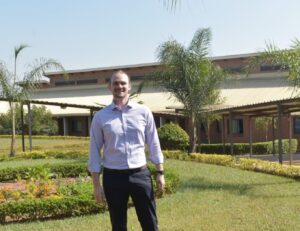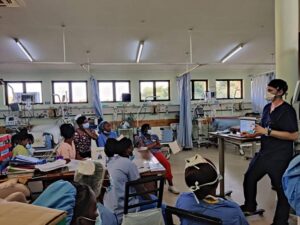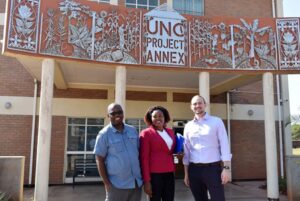Please Note: This blog has been copied with permission from CFK Africa‘s site, “Stories of Progress.” CFK Africa is an international nongovernmental organization, a registered 501(c)(3) nonprofit in the US, and an affilated entity of UNC Chapel Hill. The organization was co-founded by Tabitha Festo (a Kenyan nurse living in Kibera), Salim Mohamed (a Kenyan community organizer), and Rye Barcott (a UNC student) as “Carolina for Kibera” in 2001.
The post was written by Mitch Kimber, a CFK Africa 2022 Peacock Fellow, Registered Nurse, and MPH student in Global Health at Gillings.
CFK Africa went through a name change within the last year and so did I… Well, not a name change, but a change in my professional title as I expanded my scope, just as CFK is expanding its focus now from Kibera across other informal settlements in eight Kenyan counties.
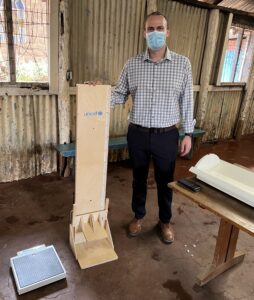
In recent years, I’ve worked as an Emergency Medical Technician and Registered Nurse. Last year, I shifted from this primarily clinical focus toward considering how health is affected on a systems level and a larger scale through global public health. My interests in public health actually started at home, seeing members of my own community, including people living with severe mental illness and experiencing homelessness, struggle with health and its social determinants. I learned that these outcomes are inextricably linked with other determinants of health like poverty, access to care, and other systemic factors.
This is what CFK figured out back when it started as Carolina for Kibera, tackling issues of poverty, access, and other systemic influences on health and wellbeing in Kibera.
Why Expand?
I was drawn to work in global health because, while I observed poor health outcomes and barriers to wellbeing at home, I also knew that in other parts of the world, the challenges might be far more overwhelming. I wanted to move toward the area of greatest need, hoping that I could make the largest positive impact. I think CFK may have similar motives, as it aims to translate the positive impact it has had at home – in Kibera – to a larger scale, advising in other areas with great needs.
As I have expanded my scope, however, I have learned about countless new challenges and seen firsthand how vastly health needs can outweigh available resources. I honestly have felt quite overwhelmed at times. So, as CFK pursues what I view as a parallel transformation to mine, I hope to learn from the organization about how to overcome what may seem to be insurmountable barriers. I’m interested to learn if CFK faces similar challenges as me.
The Power of Partnership
While here in Nairobi, I’ve been consistently asked whether I see gaps in the organization since I came in with “fresh eyes.” In order to lend perspective on this, I must reflect on why I have struggled with my own transition and my own pursuit of improving the health and livelihoods of others.
My first reflection is on an obvious challenge with careers in global health. As an outsider, I will never truly understand the challenges that communities outside of my own face. Even within my own geographical communities of my hometown and the “Triangle” in North Carolina, I will never understand the varied challenges and perspectives of all the different people with whom I may work in the hospital or who I may meet at a local coffee shop.
Realizing this, it would be foolish to assume that I could have a deep understanding of community needs in other countries across the world – at least not any time soon. I can only do my best to partner with community members, consume literature and media from those communities, and learn what my role is in working with local colleagues toward our common goal of improving wellbeing.
Perhaps this is an important consideration for CFK as well: to understand its role in collaborating with other communities as it aims to partner toward common goals. I do think that this is the mindset CFK is taking. As I talked to leaders within the organization, my understanding is that CFK is planning to partner with and assist existing organizations to better identify and address gaps in their own communities.
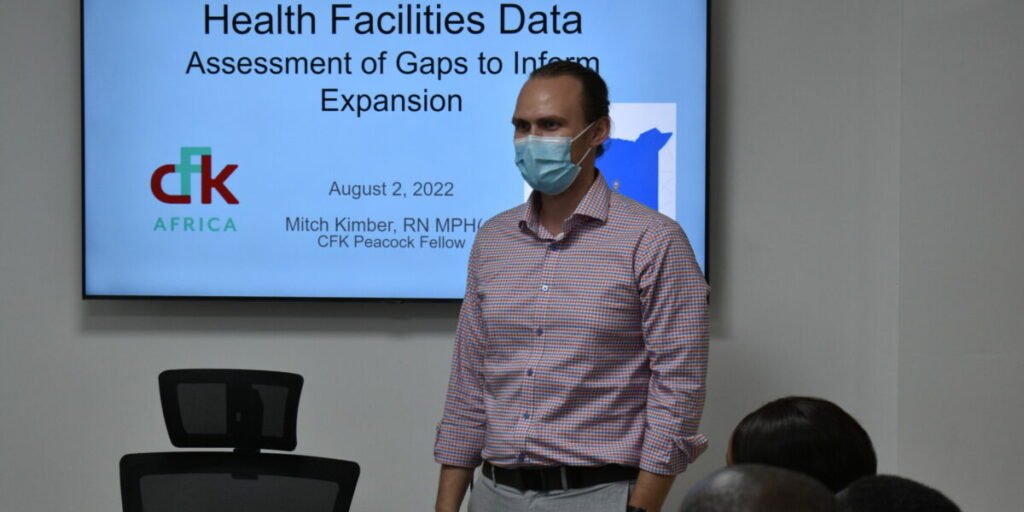
The Challenges We Face
Another great challenge for me, especially as I enter global public health, is narrowing my focus to one – or a few – areas of interest. I have just begun learning the importance of concentrating my efforts to yield higher quality results and to prevent myself from becoming burned out.
CFK is not one person, so this challenge looks different on an organizational level, but it will be interesting to see how CFK balances quality across its various programmatic areas in Kibera and while advising across multiple informal settlements.
This relates directly to another challenge I’ve faced: Am I neglecting my community at home while working abroad? For me, it’s family, friends, and the communities I served at hospitals where I worked. For CFK, I view Kibera as the organization’s family and friends.
While I’ve been away, I haven’t been able to support my people. I’ve even had moments where it was challenging to know how to support myself while I was out of my comfort zone. I am interested to learn from CFK as it expands to see how it still successfully meets the needs of Kibera despite also expending energy outside of its comfort zone.
Finding Balance
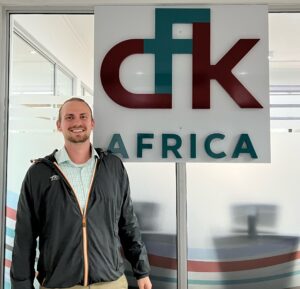
In culmination of all the above challenges and their associated emotions come questions I have to ask myself: Do I want to face these challenges? Do I think I can overcome them? Am I willing to make sacrifices in order to achieve my goals?
This brings me to the words of CFK’s late co-founder Tabitha Festo, a fellow nurse, who I’ve been told spoke of “sacrificing for success.” As CFK grows, and as I expand my scope, I think it is important that we all ask ourselves what it means to sacrifice for success and if it is something we are willing to do; to at times put aside our own needs in order to address those of other communities. Or, more importantly, how do we find a balance between meeting our own needs at home while also addressing the needs of other communities?
I don’t yet have an answer to this. There were times when I felt profoundly far from answers, asking myself why I am even here in another country and worrying that I am taking up more resources than what I am contributing. There were other moments when I felt so grateful to be engaged in projects with like-minded people who I could partner with to improve the well-being of individuals and communities near and far.
My time as a Peacock Fellow with CFK Africa was certainly an insightful experience in this slow process of my own career “expansion,” and I am excited to see how CFK overcomes similar challenges to what I am facing. All staff members have been gracious, welcoming hosts as I briefly entered their world, and I am grateful to have spent time with so many amazing people in Kibera.

